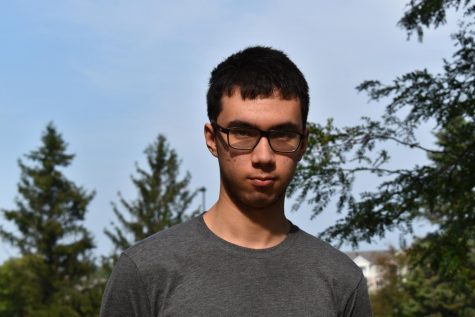Book review: “How We Became Wicked” is suspenseful and engrossing
2019’s most overlooked read comes in the form of Alexander Yates’s “How We Became Wicked,” a thought-provoking dystopia with spectacular tension building.
Simon & Schuster
Alexander Yates’s dystopian-horror novel focuses on a society torn apart by a disease called wickedness.
In the literary field, the dystopian genre has seen a massive surge in popularity within the last two decades. With its swash of science fiction, fantasy and occasional contemporary facets, it’s not hard to see why dystopia in particular has become so popularized. More than any other genre, it can effectively juxtapose fantastical ideas alongside real-world commentary.
With that in mind, there have been hits and misses. Some are effective in their ideals and descriptions; some failed to hit the mark as well as they desired. Others are blatant ripoffs of pronounced hits, and thus are crippled on arrival. But even then, I’ve read many works with familiar premises, yet had special touches by the author that made them succeed. That is why I was willing to give Alexander Yates’s “How We Became Wicked” a shot.
The story line is simple: a plague called “wickedness” has been released, and society is split. Those infected by the disease have become ravenous zombies, while the rest of the population is either hidden off or, in rare cases, immune. Throughout, we follow three teenagers as they come face to face with their circumstances.
Having to juggle the stories of three main protagonists—two with seemingly no relation to one another—is not an enviable task. Despite this, though, telling the story this way was practically a necessity given the premise. After all, what better way to demonstrate the truncation of society than to tell the stories of people on both sides of the disaster?
So, we are treated to dividing perspectives. One is from Astrid and Hank, ex-lovers living in the enclosed, barred-off society of Goldsport; Astrid is “vexed” (immune), while Hank and everyone else are in danger of getting infected. Meanwhile, on the deserted Puffin Island, Natalie is also vexed and watches over her pregnant mother and wicked grandfather. Natalie’s tale is the definite show stealer. The way Yates handles her character is focused less on building up an excessive backstory for her, and is rather focused on layering her personality in the present. Her constant perseverance and endearing anchor to protecting her loved ones are everything a main protagonist should represent. Despite her isolated life bereft of many interactions, she’s focused more on the survival of those close to her over discovering new horizons. How she watches over her baby sister Eva, a plot thread that spans the middle of the novel, showcases this altruism. When Natalie comes across a group of seemingly trustworthy scientists, she doesn’t immediately befriend them and is willing to kill if it means Eva’s life is saved. A recurring element that Yates includes in her chapters is how she constantly “hears” her sister talking to her in her head, showing that her personality has become broken, adding to the vulnerability factor.
Meanwhile, Astrid and Hank’s parts aren’t as invigorating. There’s some good stuffed in, like Astrid’s rule-breaking demeanor and her will to discover the harsh secrets her community has hidden from; Hank, on the other hand, has some particularly strong moments when he struggles to fight cowardice against his abusive father. Astrid’s growth also succeeds when it’s told how she wants to escape the walls of Goldsport and help survivors of the wickedness of whom the society may have neglected. Despite these cogent points, I couldn’t help but feel that they were thin on development at times. For starters, the “ex-lovers” situation doesn’t work, and it receives far too much focus. It gets better as the story winds down, but still ends up forming a shaky first act. Moreover, they never felt as layered as Natalie’s perspectives; where Natalie had her family as an anchor, they don’t have anything as effective.
The method Yates uses to handle these two sides isn’t like most other multi-perspective books. Authors generally handle such storytelling by weaving the stories together, with a chapter of one perspective, one chapter of another, repeat. Yates’s approach is different; he gives each about 70 to 90 pages, and then cycles back. This way, he allows each side to grow and reach a climax instead of prematurely switching settings every chapter. By the closing pages, both stories are tied together with a momentous twist, and it all wraps up soundly.
Yates’s biggest strength is his immaculate ability to build suspense. He starts off small, with everything going as planned. Slowly, warning bells begin to creep in as something goes wrong, and all of a sudden Yates throws you into an environment nearly reminiscent of a horror movie. One scene in particular, in the second act, is exemplary. Natalie and her mother, who is in the stages of childbirth and also has a sprained ankle, are locked in their claustrophobic lighthouse while her wicked grandfather searches for them, blindly shooting off bullets from a gun. You can feel the tension seeping in, feel the terrified way the protagonists are scrambling to hide themselves. Moments like this leave you hanging, waiting to see what will happen.
The plot lines both captured my interest and at the same time failed to do anything remarkable. A story line follows the ways Goldsport came to be, and the various shifts in power there. The part about how the society came to be is interesting, how greed and desire for survival can overcome sensibilities. The present-day thread when the main villain Henry Bushkirk steals control over the town, however, is cliched. The arc about a dubious corporation of scientists experimenting on the vexed and wicked population is also unremarkable. Conversely, the dilemma of getting vexed, which involves exposing a newborn baby to the wickedness and the possibility of death, induces thought-provoking discussion over how far one is willing to go to protect others. At the end of the day, I felt that Yates didn’t do quite as good of a job as he could have with the wickedness concept. He chooses to focus on less engrossing aspects parts of the time over the glimmering strands of riveting material. Still, numerous messages do end up working even if he doesn’t meet full potential cumulatively.
This brings us to the big pointer: does “How We Became Wicked” stand out on its own? The answer is mostly. It’s certainly less by-the-numbers than I was led to believe by the plot synopsis, but it’s not groundbreaking either. For a seasoned reader like myself, there was a mix of creativity and occasional uninspiredness. Readers who are less acclimated to the genre will likely enjoy it more than I did. The book is certainly a nice beginning point for anyone wanting to read dystopian.
“How We Became Wicked,” though problematic in some regards, succeeds as a new addition to the dystopian genre. The final act leaves room for Yates’s universe to expand, and hopefully he makes the decision to do so. Altogether, this is probably one of the more overlooked reads of the year, and more than warrants a read.
Grade: B
Your donation will support the student journalists of West High School. Your contribution will allow us to purchase Scholarship Yearbooks, newsroom equipment and cover our annual website hosting costs.

Edward Keen is a senior and this is his second year on staff, where he is Arts Editor. In his free time, he enjoys reading.



